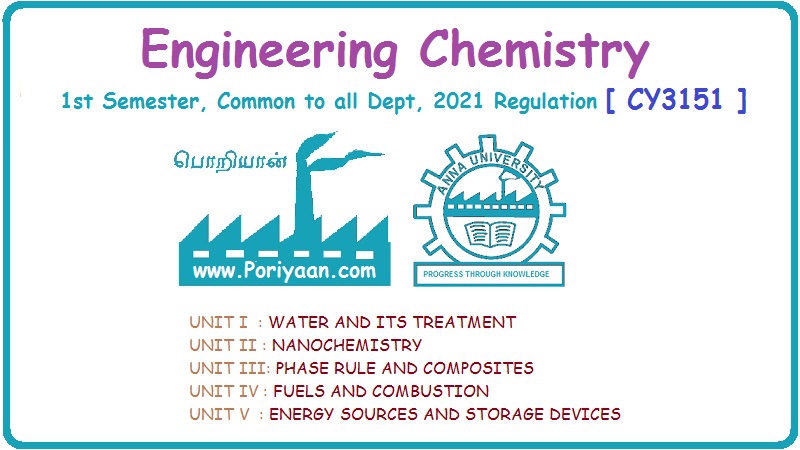Engineering Chemistry: Unit II: Nanochemistry
Anna University 2 Marks Questions and Answers
Nanochemistry | Engineering Chemistry
Engineering Chemistry : UNIT II : Nanochemistry : Anna University Two Marks Questions & Answers
Anna University TWO MARKS Questions & Answers
2. Nanochemistry
1. What are nonoparticles?
Nanoparticles are the particles, the size of which ranges from
1-100 nm.
2. What are nano-materials?
Nanomaterials are the materials having components with size less
than 100 nm at least in one dimension.
3. What is nano-chemistry? (A.U.T. (Coim) May 2011)
Nano-chemistry is the branch of nano-science, which deals with the
chemical applications of nanomaterials. It also includes the study of synthesis
and characterisation of nanomaterials.
4. Distinguish between bulk particles and nano-particles. (A.U. (CEG) Dec. 2012 June 2013)
Nano-particles
1. Size is less than 100 nm Bulk particles Size is larger in
micron size
2. Collection of few Collection of thousands of molecules molecules.
3. Surface area is more Surface area is less
4. Strength, hardness are Strength, hardness are less more
5. Name some important physical methods of synthesising
nano-materials.
1. Laser ablation
2. Chemical Vapour Deposition (CVD)
3. Electro-deposition
6. What is CVD?
CVD is Chemical Vapour Deposition. It is a process of chemically
reacting a volatile compound of a material with other gases, to produce a
non-volatile solid that deposits automatically on a suitably placed substrate.
7. What is the basic principle involved in solvothermal synthesis
of nano-materials.
Solvothermal synthesis involves the use of solvent under high
temperature (between 100°C to 1000°C) and moderate to high pressure (1 atm to
10,000 atm) that facilitate the interaction of precursors during synthesis.
8. Define nano-wires.
Nano-wire is a material having an aspect ratio ie., length to
width ratio greater than20. Nano-wires
are also referred to as “quantum wires”.
9. What are the characteristics of nano-wires.
1. Nano-wires are two-dimensional material.
2. Conductivity of a nano-wire is less than that of the
corresponding bulk materials.
3. It exhibits distinct optical, chemical, thermal and electrical
properties due to this large surface area.
10. Mention some important applications of nano-wires.
1. Nanowires are used for enhancing mechanical properties of
composites.
2. It is also used to prepare active electronic components such as
p-n junction and logic gates.
3. Semiconductor nanowire crossings are expected to play a
important role in future of digital computing.
11. What is nano-Rod?
Nanorod is two dimensional cylindrical solid material having an
aspect ratio i.e., length to width ratio less than 20.
12. What are nanoclusters? (A.U. (CEG) Dec 2012)
Nanoclusters are fine aggregates of atoms or molecules. The size
of which ranges from 0.1 to 10 nm. Of all the nano materials, nanoclusters are
the smallest sized nano materials because of their close packing arrangement of
atoms.
13. What is magic number
It is the number of atoms in the clusters of criticle sizes with
higher stability.
14. What are carbon nano-tubes.
Carbon nanotube is a tubular form of carbon with 1-3 nm diameter
and a length of few nm to microns.
15. Mentin some uses of CNTs.
1. It is used in battery technology and in industries as catalyst.
2. It is also used as light weight shielding materials for
protecting electronic equipments.
3. CNTs are used effectively inside the body for drug delivery.
4. It is used in composites, ICs.
16. Mention some characteristic properties of nanomaterials. (Chen.
A.U Jan 2010)
1. Nanomaterials are very strong and withstand extreme strain and
tension.
2. It possesses very good electrical properties and thermal
conductivity.
17. List any four nano-materials. (Coim. A.U Feb 2010)
1. Carbon nanotubes.
2. Nanowire.
3. Qauntum dots.
4. Dendrimers.
Engineering Chemistry: Unit II: Nanochemistry : Tag: Engineering Chemistry : Nanochemistry | Engineering Chemistry - Anna University 2 Marks Questions and Answers
Related Topics
Related Subjects
Engineering Chemistry
CY3151 1st Semester | 2021 Regulation | 1st Semester Common to all Dept 2021 Regulation
